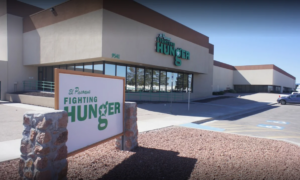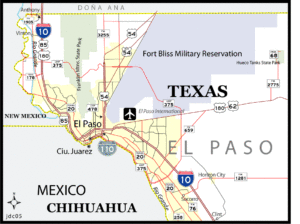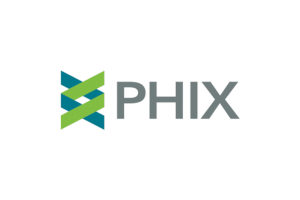Written by Malik Chambers
Paso del Norte Information Exchange (PHIX) stands as a fixture of collaborative health care improvement since its establishment in 2010. The organization was founded by visionary El Paso health leaders who recognized the potential of technology in fostering better health outcomes. Headquartered in El Paso, TX, PHIX operates with a mission to enhance health care through robust collaboration and trustworthy data technology. The organization serves a vital role in the health ecosystem of west Texas and southern New Mexico, acting as a facilitator for seamless data sharing among various health care entities. Within the team of dedicated individuals pushing forward PHIX’s mission is Juan Nanez, Director of Programs. We had the opportunity to chat with Juan about his efforts with PHIX, and his deep connection with the El Paso community.
Juan Nanez’s Journey
Juan Nanez’s transformative journey with PHIX symbolizes dedication, growth, and commitment. Starting as an intern, Juan’s passion for the organization’s mission quickly propelled him into a management role. Over the years, his exemplary leadership led him to the position of Director of Programs. In this multifaceted role, Juan not only oversees operational aspects of the nonprofit regional Health Information Exchange (HIE) but also plays a pivotal part in driving innovation and securing new grants to advance PHIX’s impact in the health care sector.
Growing up in El Paso has deeply shaped Juan Nanez’s outlook on health care. His roots in a community dealing with scarce resources gave him a firsthand understanding of the struggles residents endured, from the absence of sidewalks to the shortage of recreational spaces. The community’s rapid expansion highlighted pressing needs, emphasizing the crucial role organizations like PHIX play in tackling health disparities and enhancing the overall welfare of the community.
Before joining PHIX, Juan took the path of a Registered Nurse (RN), diving into the world of health care with a hands-on approach. Though his stint as an RN was brief, it was during this time that he delved into the home health industry, offering him a deeper understanding of the communities he was committed to serving. As he navigated the health care landscape of El Paso, Juan explored diverse suburban and group areas, serving populations that lacked proper resources and health insurance, and gaining unique insights into the daily lives of his patients. This hands-on experience provided him with a genuine understanding of the nuanced household situations facing the community, infusing his health care approach with compassion and a personal touch. This rich background plays a pivotal role in shaping Juan’s strategic approach at PHIX, where he prioritizes inclusivity and education for underserved populations.
Challenges Presented in the El Paso Region
PHIX is on a mission to make a difference in the El Paso region, a place marked by unique challenges in health care. The community, spanning West Texas, New Mexico, and Las Cruces, is diverse but faces a higher-than-average poverty rate, especially among the youth.
Juan shared some eye-opening insights into the social determinants of health in this area. According to City Data, nearly 19% of El Paso residents were below the poverty level in 2022, significantly higher than the state average. The situation is even tougher for those with lower educational attainment, with over 31% of non-high school graduates living in poverty.
These economic struggles are just part of the story. The region also grapples with limited resources, leading to disparities in access to food and health care. PHIX’s coverage isn’t just extensive; it’s a commitment to addressing these issues head-on. By offering crucial services, PHIX aims to improve health outcomes and bridge the gaps in this diverse and challenging community. The organization’s approach reflects a genuine dedication to making a positive impact where it’s needed the most.
PHIX addresses Food Apartheid through FoodFarmacy Program
PHIX has joined forces with the El Pasoans Fight Hunger Food Bank, creating a game-changing partnership. Through this collaboration, providers can now send electronic referrals directly to the Food FARMacy program. This EPFH initiative goes beyond just providing food – it’s all about tailoring nutrition services to individuals dealing with conditions like diabetes, kidney disease, and hypertension.

What makes the Food FARMacy program unique is its comprehensive approach. Patients not only get weekly access to the Food FARMacy store but also benefit from the expertise of a registered dietitian. This means they’re not just receiving nonperishable items and groceries; they’re gaining valuable knowledge and guidance to make informed decisions about their diet.
By teaming up with the Food FARMacy program, PHIX is showing a real commitment to addressing the specific needs of both patients and providers. It’s a hands-on, individualized approach that recognizes the connection between health care and nutrition. This collaboration isn’t just about addressing immediate needs; it’s about empowering individuals to take control of their health in a more holistic way. PHIX’s involvement highlights a dedication to making a positive impact on both the medical and social aspects of health in a coordinated and meaningful manner.
PHIX’s tailored approach to Health Information Exchange
PHIX understands the financial hurdles faced by smaller health care providers when engaging with Health Information Exchange (HIE) organizations. While larger institutions often have the financial capacity to participate, smaller private clinics and providers struggle due to budget constraints. In response, PHIX has crafted a tailored approach to health information management and exchange specifically for El Paso providers.
For example, Juan highlighted PHIX’s proactive approach to tackling diabetes within diverse communities in the El Paso region. He discussed the thoughtful consideration given to tailoring interventions based on specific community needs, emphasizing the importance of looking at data at the ZIP code level. For instance, Juan suggested evaluating areas with a higher concentration of older individuals to determine whether in-person diabetes programs would be more effective. On the other hand, in more rural regions where a younger population is prevalent, he proposed directing efforts towards telehealth services. PHIX’s nuanced and data-driven strategy aims to ensure that diabetes management initiatives are not one-size-fits-all but are instead tailored to the unique characteristics and requirements of each community within the El Paso region.

Acknowledging the diverse needs of the community, PHIX adopts an individualized system, delving into community health care requirements at a zip code level. To address the financial concerns of smaller providers, PHIX introduces a pragmatic solution – a membership model with custom data integration. In this membership, PHIX takes on the responsibility and cost of integrating providers’ data into their network, enriching the overall dataset. This approach not only ensures the inclusion of major hospitals and outpatient facilities but also focuses on continuous growth and depth of data. By offering this custom data integration strategy, PHIX enables seamless onboarding of smaller entities like individual physician practices and dietitian groups, enriching the network’s scope and depth for the collective benefit of the health care community in the region.
Civitas and PHIX’s Shared Goals
Civitas Networks for Health and PHIX share a common vision of delivering health care solutions to communities with diverse needs through data-driven and multi-stakeholder approaches. As a national nonprofit member organization spanning the majority of the US states, Civitas’ membership provides a platform for health care data organizations and health improvement organizations to exchange best practices and approaches. Juan Nanez is not just a part of Civitas’ community but also actively engages in the Emerging Leaders Council (ELC), designed for rising leaders.
The ELC, focusing on multi-stakeholder collaboration and data-informed approaches, aligns with Civitas’ commitment to fostering practical and forward-thinking leaders in the industry. According to Juan, Civitas and the ELC serve as platforms for shared knowledge and collaborative efforts across various stakeholders. He emphasizes the importance of understanding how different pieces of the puzzle fit together and collaborating to collectively achieve goals, mirroring the local approach taken by PHIX.
In conclusion, Juan Nanez’s visionary outlook for a healthier El Paso further underscores the significance of his leadership at PHIX. His involvement in national networks like Civitas Networks for Health and the ELC reflects a commitment not only to local health care challenges but also to contributing to broader conversations and collaborative efforts that can drive positive change in health care on a larger scale.
To learn more, please be sure to visit the PHIX website.






